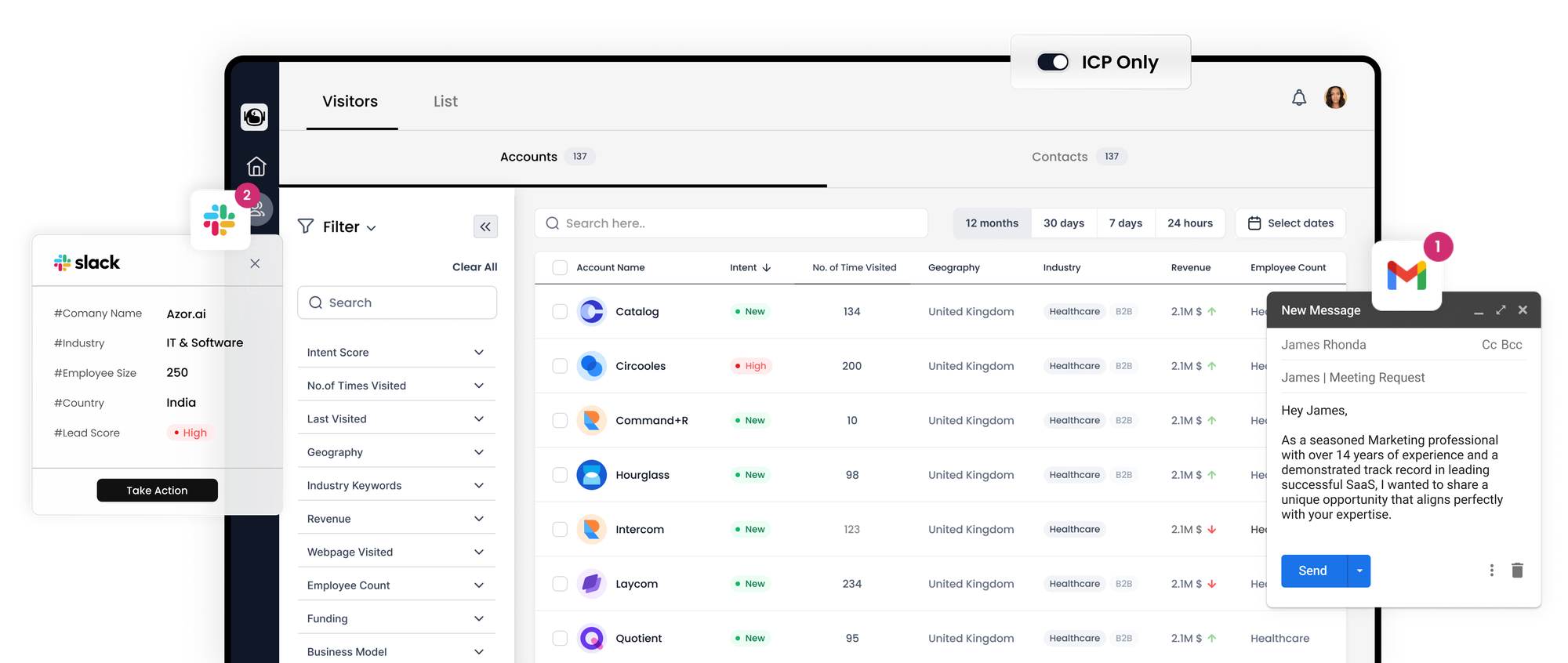The Comprehensive Guide to B2B Marketing Automation in the Digital Era

Running a B2B business comes with its fair share of challenges, and one of the most significant among them is shortening the sales cycle. This is where B2B marketing automation steps in, offering a process designed to streamline your workflows and automate repetitive tasks, ultimately saving you both time and money.
Effective B2B marketing automation goes beyond merely improving your sales funnel; it also enhances the efficiency of individual processes. It automates various tasks, including lead generation, lead nurturing, and email marketing, freeing up your employees to concentrate on qualified leads ready to make a purchase.
However, the advantages of B2B marketing automation extend beyond shortening sales cycles, and this article will delve into why you should consider utilizing a marketing automation platform. We'll also explore different marketing automation strategies that businesses employ, complete with illustrative examples, and provide insights into some of the best B2B marketing automation platforms tailored to your business needs.

Understanding B2B Marketing Automation
At its core, B2B marketing automation is the process of streamlining marketing tasks through workflows and triggers to enhance team productivity. The primary goal of marketing automation software is to effectively capture, assess, and nurture leads and accounts, ensuring they are seamlessly matched with the most suitable sales team member(s).
Another pivotal objective is to sustain engagement through sales and marketing efforts, ultimately facilitating the successful closure of deals.
The Benefits of B2B Marketing Automation for Companies
A survey by Sales Fusion revealed that brands employing marketing automation tools experienced a significant 14.5% increase in sales productivity, coupled with an uptick in lead generation and a reduction in marketing overhead costs. This is why a substantial 63% of B2B marketers intend to increase their marketing automation budget in the current year. The marketing automation industry is rapidly growing, with estimations suggesting that the global marketing automation market size will reach USD 8.42 billion by 2027.
However, the survey also pointed out that quality automation and the creation of personalized content using marketing automation tools pose significant challenges.
Let's explore how to unlock the full potential of your marketing automation software and boost your revenue.
Effective B2B Marketing Automation Strategies
1. Lead Scoring
Lead scoring entails assigning values to prospects based on specific attributes or characteristics, including their level of interest in your product or service or their actions on your website. This data-driven approach enables you to concentrate your efforts on nurturing leads that are more likely to convert into paying customers. For instance, an IT service provider can assign higher scores to leads who have downloaded a whitepaper or attended a webinar, indicating a higher level of interest. Automating lead scoring in your marketing automation software streamlines the process, as the platform automatically assigns scores and qualifies your leads based on your defined lead scoring model.
2. Trigger Email Marketing
Trigger marketing is a B2B marketing automation strategy that revolves around sending emails or messages triggered by user actions. A common example is welcome or onboarding emails, sent when someone signs up or subscribes to a brand. Welcome emails, on average, boast a 50% open rate and exhibit 33% higher engagement compared to other email messages. Surprisingly, only 57.7% of companies send welcome emails to their new users.
3. Customer Onboarding
Customer onboarding involves acquainting new clients with your products and services. Using marketing automation, a B2B company can send a series of welcome emails accompanied by video tutorials to guide new customers through the setup and configuration process. For example, Zapier aids in onboarding its customers by providing a video tutorial and a brief description of how to use the platform, along with a link to the help documentation webpage for further assistance.
4. Upselling
To retain existing customers, many companies employ the B2B marketing automation strategy of upselling and cross-selling. By tracking customer behavior, purchase history, and engagement patterns, you can trigger automated campaigns to promote complementary products or premium upgrades. For instance, Slack, a popular instant messaging and business communications platform, employs automation to send personalized recommendations to customers, encouraging them to upgrade to a paid plan that offers enhanced messaging capabilities and access to conversation history.
5. Lead Nurturing
Lead nurturing involves building relationships with potential customers who have been identified as the right leads. Once you've identified these leads, it's essential to convince them why your brand is the best choice. B2B companies can establish automated lead nurturing campaigns that send a series of educational emails to prospects, sharing valuable industry insights, case studies, and success stories. For instance, Pinterest, an online image-sharing and social media platform, educates its audience on how to use Pinterest effectively, highlighting various tools on the Pinterest Business account that can aid in brand growth.
6. Behavior-based Segmentation
Segmenting your audience based on their engagement and interactions with your website, emails, and content allows you to send targeted and relevant emails. Analyzing data on how leads interact with your digital assets empowers you to automate campaigns that cater to their specific needs and preferences, enhancing engagement and conversion rates. For example, a SaaS company can segment its audience based on the pages they visit on its website, enabling the delivery of targeted content and offers aligned with their interests.
In conclusion, B2B marketing automation is a powerful tool that can streamline your marketing efforts, enhance productivity, and boost revenue. By effectively implementing these strategies, businesses can capitalize on the benefits of marketing automation and stay ahead in the dynamic landscape of digital marketing.
Exploring Remarkable B2B Marketing Automation Case Studies
In this section, we will delve into real-world B2B marketing automation examples that can inspire and be implemented within your organization.
1. Customer.io: A 4.2% Sales Boost through Concierge Onboarding
Customer.io, an automated messaging platform facilitating data-driven messages and emails across multiple platforms, implemented the concept of "concierge onboarding" to attract and swiftly onboard customers. Concierge onboarding revolves around providing leads and customers with personalized service to expedite their product or service familiarization process.
Under this approach, Customer.io engaged with its customers through various communication channels, including automated emails, scheduled phone calls, and automated text messages. Automated reports were generated to evaluate the success rates of each communication method and determine the most effective means of connecting with prospects while shortening the sales cycle.
The result was impressive: a 4.2% conversion rate of individuals who had been offered concierge onboarding, transitioning to paid accounts.
2. PandaDoc: Harnessing Chatbots for Lead Generation and Conversion
Automated chatbots, recognized for their prowess in customer service, also serve as valuable tools in marketing efforts. They can personalize campaigns and educate leads throughout their buying journey. PandaDoc, a document automation and e-signing service, deployed chatbots on their website with the primary objective of converting website traffic into product demos.
The outcome was remarkable. After two years of utilizing and refining chatbot workflows and content links, chatbot-generated leads became one of the top five sources for both lead generation and conversion. To effectively utilize chatbots, careful planning and testing are essential, involving the creation of a robust script by copywriters or email marketers.
3. Business Ninjas: An 82% Reduction in Marketing Costs with CRM Integration
Business Ninjas, a digital marketing service provider based in Manchester, specializes in leveraging LinkedIn's power to drive marketing and sales for businesses. As customers poured in, manual tracking became unwieldy, necessitating a marketing solution to manage their extensive contact database.
4. Evans Manufacturing: A 3x Surge in Email Open Rates and 23% Revenue Growth
Evans Manufacturing, a company specializing in personalized promotional products for various industries, faced fierce competition and sought to transition to relationship-based selling to expand its market presence. The adoption of a marketing automation tool enabled them to establish a well-defined sales cycle that included automated, targeted email follow-ups. This strategic move resulted in a 3x increase in email open rates.
Prior to employing marketing automation tools, Evans Manufacturing struggled with low email campaign open rates and lacked the ability to track click-through rates (CTR). The introduction of targeted email campaigns allowed them to accelerate their sales process and gain clear insights into their progress.
5. CentricsIT: A 59% Increase in Leads and $1.5 Million in Revenue through Marketing Automation
CentricsIT, an IT solutions provider for enterprise data centers, grappled with lead management and the need for a more effective return on investment (ROI). Recognizing the potential of integrating marketing automation with email marketing, Mandy Hauck, the Manager of Marketing Communications, embarked on a transformative journey.
Before the implementation of marketing automation, their email approach lacked refinement, primarily consisting of generic holiday emails sent to their contact database. However, with the automation tool in place, CentricsIT focused on four key areas: CRM integration, lead scoring, triggered email campaigns, and advanced reporting.
The outcome was astounding—a 59% surge in lead generation and revenue growth exceeding $1.5 million. This success story underscores the transformative power of effective marketing automation implementation.
These B2B marketing automation examples demonstrate the tangible benefits and positive impact that automation strategies can bring to organizations, from boosting sales and lead generation to improving customer engagement and streamlining operations.
Conclusion
B2B marketing automation need not be daunting. By harnessing the appropriate tools, you can employ marketing automation to propel your business to greater success. A staggering 78% of marketers have attested to the revenue-boosting potential of marketing automation.
While the selection and integration of the ideal marketing automation platform may require some investment in time and effort, the rewards significantly outweigh the initial costs. This endeavor not only saves valuable time and resources but also elevates team productivity. By enabling your team to concentrate on enhancing the customer experience, you pave the way for increased revenue and long-term success.
